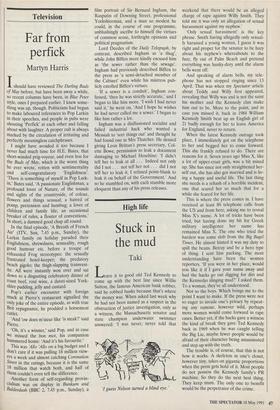Television
Far from perfick
Martyn Harris
Ishould have reviewed The Darling Buds of May before, but have been away a while, so recent columns have been, in Blue Peter style, ones I prepared earlier. I knew some- thing was up, though. Politicians had begun to make laboured references to Pop Larkin in their speeches, and people in pubs were shouting 'Perfick' at each other and falling about with laughter. A proper cult is always marked by the circulation of irritating and Perfectly meaningless catchphrases.
I might have avoided it too because I never had much time for H.E. Bates, that short-winded prig-voyeur, and even less for the Buds of May, which is the worst thing he ever wrote; rotten with sentimentality and self-congratulatory 'Englishness'. `There is something of myself in Pop Lark- in,' Bates said. 'A passionate Englishman, a profound lover of Nature, of the sounds and sights of the countryside, of colour, flowers and things sensual; a hatred of pomp, pretension and humbug; a lover of children and family life; an occasional breaker of rules, a flouter of conventions.' In short, a damned good chap all round.
In the final episode, 'A Breath of French Air' (ITV, Sun, 7.45 p.m., Sunday), the Larkin family on holiday paraded their Englishness, shrewdness, sensuality, rough good humour etc. before a troupe of exhausted Frog stereotypes: the sexually frustrated hotel-keeper; the predatory beach gigolo; the thigh-slapping transvest- ite. All were instantly won over and sat down to a disgusting celebratory dinner of roast beef, rosé wine, a duvet-sized York- shire pudding, jelly and custard. Pop's earlier encounter with foreign muck at Pierre's restaurant signalled the only joke of the entire episode, as with true Brit repugnance, he prodded a horsemeat cutlet.
`And 'ow does m'sieur like 'is steak?' said Pierre.
'Oh, it's a winner,' said Pop, and in case we missed the bon mot, his companion hammered home: 'And it's his favourite.'
This was 'Alio 'Alto on a big budget and I don't care if it was pulling 18 million view- ers a week and almost catching Coronation Street in the ratings, because it is the same 18 million that watch both, and half of them couldn't even tell the difference.
Another form of self-regarding provin- cialism was on display in Bunkum and Balderdash (BBC 2, 7.45 p.m., Sunday), a film portrait of Sir Bernard Ingham, the Rasputin of Downing Street, professional Yorkshireman, and a man so modest he could, in the course of one programme, unblushingly ascribe to himself the virtues of common sense, forthright opinions and political pragmatism.
Lord Deedes of the Daily Telegraph, by contrast, described Ingham as 'a thug', while John Biffen more kindly excused him as 'the sewer rather than the sewage'. Ingham had previously described Biffen to the press as 'a semi-detached member of the Cabinet' even while his mistress pub- licly extolled Biffen's virtues. `If a sewer is a conduit', Ingham con- fessed, 'then he was strictly accurate,' and I began to like him more. 'I wish I had never said it,' he went on, 'And I hope he wishes he had never called me a sewer.' I began to like him rather a lot.
Ingham was a disillusioned socialist and failed industrial hack who wanted a Messiah to 'sort things out' and thought he had found one in Mrs Thatcher. He denied giving Leon Brittan's press secretary, Col- ette Bowe, permission to leak a document damaging to Michael Heseltine: 'I didn't tell her to leak at all . . . Indeed not only did I not . . . not tell her not . . . did I not tell her to leak it, I refused point-blank to leak it on behalf of the Government.' And so he stumbled on, with each stumble more eloquent than any of his press releases.


























































 Previous page
Previous page